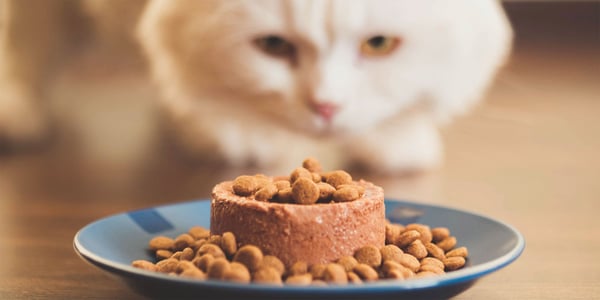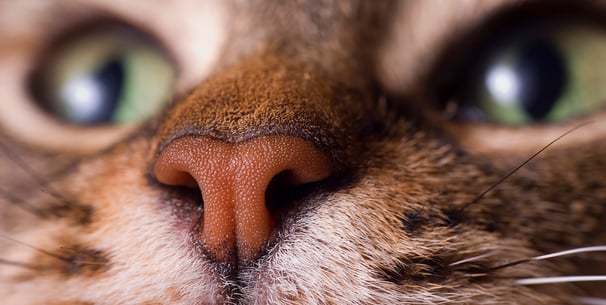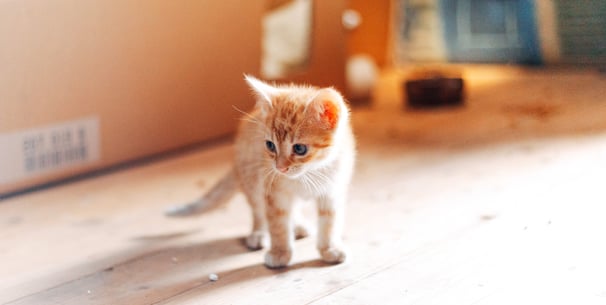Cat Not Eating Much But Acting Normal? Reasons Why
Index:



Introduction
It is a cause for concern for any pet parent when your cat stops eating or has a loss of appetite. There are many reasons why this could happen. It could be a behavioural issue, a picky eating situation, or a health problem.
One of the most common causes of this is dental disease, which can lead to pain and tooth loss due to abscesses or infection. Other causes may be kidney failure, diabetes, pancreatitis or other medical conditions that require veterinary care or treatment.
If you notice other changes in your cat's behaviour such as lethargy, vomiting/upset stomach, weight loss, lack of appetite, excessive drinking or urination, it’s important to take them to see their vet immediately as they will be aware of the clinical signs of any condition.
If you have other food related issues, check out our guides to dry cat food, hypoallergenic cat food, as well as answering other questions such as "can cats eat pork?"
What are the reasons why a cat may not eat?



There are many reasons why a cat may not eat. Cats may not eat if they are not feeling well, if they are stressed, or if they do not like the food. If you are on dry cat food, try some wet food and see how they do, or conversely, try dry food if they are currently on a wet food diet.
Keep an eye on your cat's food bowl and If a cat does not eat for more than two days, it is important to take the cat to the veterinarian.
The vet can help determine what is causing your cat's lack of appetite and will be able to give you some suggestions and advice on how to get your kitty back in shape.
Cat owners should also be keenly aware that if your cat is overweight, it's important to keep him/her from becoming too obese. They could have a liver disease which leads to them going off their food.
Vets suggest that if your cat is indeed overweight and they are going off their food, this is one of the common signs that he/she may have developed a serious form of liver disease called hepatic lipidosis.
If this is the case, contact your vet for their advice on weight loss and how to manage their eating habits. All it takes is some loving care and attention to help with any appetite loss or diagnosed conditions your cat may have.
If your cat is drinking more water than usual, but not eating, then this could be an indication of kidney disease. They will not want to eat as toxins build up in their body, making them feel nauseous, but they will drink large amounts of water.
That's where Waggel pet insurance can help. If you are a Waggel member, you have 24/7 access to an online video vet, as well as excellent health coverage for true peace of mind.
How come my cat is not eating but is acting normal?



It might seem perplexing if your cat appears perfectly healthy but is not eating, or displays food avoidance. Some cats may have periods where they do not eat as much so it's important to keep a keen eye on the level of food in their bowl.
Your cat may be acting normal, even though its appetite isn't quite right. This could be due to them growing bored of their food (picky eaters), dental issues, or stress. If your cat is stressed out, they may be put off their food or have a changing appetite.
If they haven't eaten in a while, there can also be a number of reasons a cat has quit eating.
Some people believe that the cat became depressed and stopped eating as a result. Other possible reasons might include injury or illness.
There are a few things highlighted below that you can do to determine the cause of the hunger strike.
Obviously, the best way is to take your cat to a vet for an examination to make sure there isn't something illness-related going on, such as dental disease, diabetes, kidney failure, etc.
What should you do if your cat is not eating?



Cats are typically creatures of habit. If you notice any changes in their behaviour, keep a watch. This is especially important if they start to lose weight, stop grooming themselves properly, or have other behavioural changes.
If you notice any of these things happening to your cat you should take them to the vet right away for a check-up and some treatments that can help them get back to normal.
If your cat is not eating because it appears that the food is unappetising, try switching brands or types of food altogether. If you have tried human food with your cats such as tuna, or another type of food, and they don't eat this, then you may need to have your cat checked for gastrointestinal issues or have some diagnostic test at the vet.
You could also try the following to help your cat start eating again: Offer a variety of foods in different shapes and sizes (e.g., pieces of meat, biscuits, treats, etc) to see if they take any of this food.
If that doesn't work, then it may be time to consider feeding your cat their regular food by hand. This can help prevent digestive problems and other health issues from occurring and determine if something else is going on.
What are possible causes of a cat not eating?



Cats are finicky creatures when it comes to their food. They can be picky eaters, but if they refuse to eat their food for more than a day, there could be something wrong with them. Some reasons why a cat may stop eating include when the cat has experienced an illness or when the cat has lost its appetite after having surgery.
As we highlighted above, there are several things that could be causing your cat not to eat, but here are a few more reasons why according to the experts:
1 . Your cat has had vaccines recently
If your cat recently had any form of vaccination or other injection, it may explain a sudden change in appetite. While seemingly uncommon, this behaviour is completely normal in cats and nothing to worry about.
It can last for up to two weeks after the vaccination or injection. If you notice an increase in vomiting, diarrhoea or weight loss over several days then please contact your vet as soon as possible so they can investigate further.
2 . Psychological stress and behavioural problems can cause your cat to stop eating
Eating is not just a cat’s favourite pastime, but also quite obviously their primary means of survival.
If your cat suddenly stops eating, it could indicate that they are experiencing psychological stress or behavioural problems.
There are many reasons why a cat might stop eating and the solutions may depend on the cause. If your house just got a new pet, for example, it could be causing anxiety and additional stress for your cat and might even cause them to stop eating.
The first thing you should do is to take your cat to a veterinarian to rule out any physical problems. If the vet determines that there are no medical reasons for your cat's behaviour, then it may be time to address the psychological issue.
Cats usually stop eating as a way of coping with their anxiety. They instinctively know how to deal with hunger pangs and possible starvation so they will not eat when they feel they are in danger or stressed out.
Once you know the source of the issue, setting to work to solve it is the best step. Concentrate on the cat more intently, making them feel at ease and seeking out their level of comfort. This is to help alter their behaviour and get them accustomed to change.
3 . You recently moved or travelled with your cat
Cats are territorial animals and in most cases, they do not like to travel. Cats have a natural tendency to avoid changes in their environment, so when you move from one place to another, your cat might become reclusive and stop eating.
If you are planning to bring your cat on a road trip, be sure to give it plenty of time to adjust to the rumbling of the car and new smells before throwing them into an unfamiliar environment.
If you have recently moved to a new home or if you live in an area where there aren’t many cats around, it can take some time for them to get used to their surroundings so they don't suffer as much from this environmental stress.
Conclusion
It is common for cats to skip a meal or two, but if your cat isn’t eating and this has been going on for more than a day, it may be time to take them to the vet. The most common reasons cats stop eating are illness, stress, boredom, and dental issues.
Cats can also become anorexic with an underlying medical condition such as diabetes.
One of the best ways to keep on top of your cat's health is by having a good pet insurance policy. Especially a policy such as Waggel's. (Yes, we are biased, we just love our own pets and built Waggel to help yours!)
Our policies come with 24/7 online video vet access, great money-saving rewards for you and your pets, and an easy-to-manage policy with your own custom dashboard.
Click here to get a quote today and see how much it will cost to insure your cat with Waggel.
If you want to learn more about the ins and outs of pet insurance, then see our pet insurance dictionary.
Waggel Pet Insurance
Need more help? You're in luck if you're a Waggel Pet Insurance member. Along with our excellent coverage, we offer access to a 24/7 online vet to answer all your sticky questions, especially if you need grooming assistance.
Not a member? Why not get a quote now and cover your furry friend for a range of illnesses, all while enjoying our amazing perks and rewards.
Want more like this?
Get updates from us with helpful info, advice, answers to frequently asked questions and much more.
Index:
Related posts:
Get your quote
Along with our excellent coverage, we offer access to a 24/7 online vet to answer all your sticky questions.





